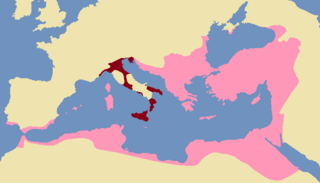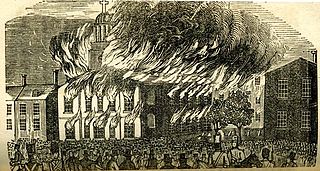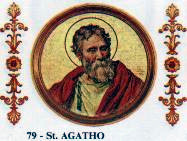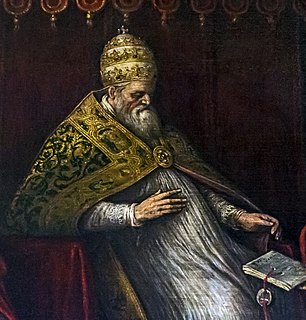The Liber Diurnus Romanorum Pontificum includes a formula of profession of faith that a newly elected Pope sent to the representative at Ravenna of the Emperor of Constantinople soon after the Third Council of Constantinople (680-681), which is referred to in the text as held "recently".
Liber Diurnus Romanorum Pontificum is the name given to a miscellaneous collection of ecclesiastical formulae used in the Papal chancery until about the 11th century. It fell into disuse through the changed circumstances of the times and was soon forgotten and lost.

The pope, also known as the supreme pontiff, is the Bishop of Rome and ex officio leader of the worldwide Catholic Church. Since 1929, the pope has also been head of state of Vatican City, a city-state enclaved within Rome, Italy. The current pope is Francis, who was elected on 13 March 2013, succeeding Benedict XVI.

The Exarchate of Ravenna or of Italy was a lordship of the Byzantine Empire in Italy, from 584 to 751, when the last exarch was put to death by the Lombards. It was one of two exarchates established following the western reconquests under Emperor Justinian to more effectively administrate the territories, along with the Exarchate of Africa.
This profession of faith cannot have been presented to the Exarch of Ravenna at any time after the papacy revolted - soon after 727 (see Eutychius (exarch)) - against the Emperor. The Exarchate itself was finally extinguished in 752.
Eutychius was the last Exarch of Ravenna.
The profession of faith in the Liber Diurnus Romanorum Pontificum is addressed to Saint Peter in a form somewhat reminiscent of an oath. However, the book nowhere calls it an oath.

Saint Peter, also known as Simon Peter, Simeon, Simon, or Cephas, was one of the Twelve Apostles of Jesus Christ, and the first leader of the early Church.
Ambiguous expressions in some anti-Catholic writings could lead incautious readers to suppose that the text in the Liber Diurnus Romanorum Pontificum was used by all newly elected Popes until the eleventh century and that it had been in use since the fifth century.

Anti-Catholicism is hostility towards Catholics or opposition to the Catholic Church, its clergy and its adherents. At various points after the Reformation, some majority Protestant states, including England, Prussia, and also Scotland made anti-Catholicism and opposition to the Pope and Catholic rituals major political themes, with anti-Catholic sentiment at times leading to religious discrimination against Catholic individuals. Historian John Wolffe identifies four types of anti-Catholicism: constitutional-national, theological, popular and socio-cultural.
An example is William Webster's An Ecumenical Council Officially Condemns a Pope for Heresy:
- In the Liber Diurnus the Formulary of the Roman Chancery (from the fifth to the eleventh century), there is found the old formula for the papal oath...according to which every new Pope, on entering upon his office, had to swear that "he recognised the sixth Ecumenical Council, which smote with eternal anathema the originators of the heresy (Monotheletism), Sergius, Pyrrhus, etc., together with Honorius" (Charles Joseph Hefele, A History of the Councils of the Church (Edinburgh: Clark, 1896), Volume V, pp. 181-187).
However, Webster does not expressly state that the formula in the Liber Diurnus Romanorum Pontificum was used by Popes from the fifth to the eleventh century, which would obviously be impossible. The Liber Diurnus formula speaks of the Third Council of Constantinople as recently held and mentions by name the Pope and the Emperor involved in the Council. Popes outside the 682-727 period would not have spoken of the 680-681 Council as recent, and it would be particularly ridiculous to suppose that Popes from two centuries before the Council knew anything whatever about that Council.
This page is based on this
Wikipedia article Text is available under the
CC BY-SA 4.0 license; additional terms may apply.
Images, videos and audio are available under their respective licenses.

Pope Agatho served as the Pope from 27 June 678 until his death in 681. He heard the appeal of Wilfrid of York, who had been displaced from his See by the division of the Archdiocese ordered by Theodore of Canterbury. During Agatho's tenure, the Sixth Ecumenical Council was convened which dealt with the monothelitism controversy. He is venerated as a saint by both the Catholic and Eastern Orthodox Churches.

Pope Honorius III, born as Cencio Savelli, was head of the Catholic Church and ruler of the Papal States from 18 July 1216 to his death in 1227.

Pope Benedict II was Pope from 26 June 684 to his death in 685. Pope Saint Benedict II's feast day is May 7.

Pope Boniface IV was Pope from 25 September 608 to his death in 615. He is venerated as a saint in the Catholic Church with a universal feast falling annually on 8 May. Boniface had served as a deacon under Pope Gregory I, and like his mentor had made his house into a monastery. As Pope, he encouraged monks and monasticism. With permission of the Emperor, he converted the Pantheon into the Church of St. Mary and the Martyrs. In 610, he conferred with Mellitus, first bishop of London, regarding the needs of the English Church.

Pope Leo II was Pope from 17 August 682 to 28 June 683. He is one of the popes of the Byzantine Papacy.

The Second Council of Constantinople is the fifth of the first seven ecumenical councils recognized by both the Eastern Orthodox Church and the Roman Catholic Church. It is also recognized by the Old Catholics and others. Protestant opinions and recognition of it are varied. Some Protestants, such as Calvinists and Lutherans, recognize the first four councils, whereas most Anglo-Catholics accept all seven. Constantinople II was convoked by the Byzantine Emperor Justinian I under the presidency of Patriarch Eutychius of Constantinople. It was held from 5 May to 2 June 553. Participants were overwhelmingly Eastern bishops—only sixteen Western bishops were present, including nine from Illyricum and seven from Africa, but none from Italy—out of the 152 total.

The Third Council of Constantinople, counted as the Sixth Ecumenical Council by the Eastern Orthodox and Catholic Churches, as well by certain other Western Churches, met in 680/681 and condemned monoenergism and monothelitism as heretical and defined Jesus Christ as having two energies and two wills.

Monothelitism or monotheletism is a particular teaching about how the divine and human relate in the person of Jesus. The Christological doctrine formally emerged in Armenia and Syria in 629. Specifically, monothelitism is the view that Jesus Christ has two natures but only one will. That is contrary to the Christology that Jesus Christ has two wills that correspond to his two natures (dyothelitism). Monothelitism is a development of the Neo-Chalcedonian position in the Christological debates. Formulated in 638, it enjoyed considerable popularity, even garnering patriarchal support, before being rejected and denounced as heretical in 681, at the Third Council of Constantinople.

Pope Severinus was Pope two months, from 28 May until his death on 2 Aug. He became caught up in a power struggle with the Byzantine Emperor Heraclius over the ongoing Monothelite controversy.

Pope Constantine was Pope from 25 March 708 to his death in 715. With the exception of Antipope Constantine, he was the only pope to take such a "quintessentially" Eastern name of an emperor. During this period, the regnal name was also used by emperors and patriarchs.

Pope Vitalian reigned from 30 July 657 to his death in 672. He was born in Segni, Lazio, the son of Anastasius.
While a papal oath can be any oath taken by a pope, such as that which Pope Leo III took on 23 December 800 at a council held in Rome in the presence of Charlemagne declaring himself innocent of the charges brought against him, the term is used in particular for the "Papal Oath" that some Traditionalist Catholics say was taken by the popes of the Catholic Church, starting with Pope Saint Agatho who was elected on 27 June 678. They claim that over 180 popes, down to and including Pope Paul VI, swore this oath during their papal coronations. Pope John Paul I, Pope John Paul II, Pope Benedict XVI, and Pope Francis who had no coronation ceremonies, did not take the oath, and some Traditionalists interpret this fact negatively, even to the point of declaring them to be false popes.
Olympius was an Exarch of Ravenna (649–652). Prior to his term as exarch, Olympius was an imperial chamberlain at Constantinople.
Sergius I was the Ecumenical Patriarch of Constantinople from 610 to 638. He is most famous for promoting Monothelite Christianity, especially through the Ecthesis.
Macarius I of Antioch was Patriarch of Antioch in the 7th century, deposed in 681 for professing monothelitism.

In the history of Christianity, the first seven ecumenical councils include the following: the First Council of Nicaea in 325, the First Council of Constantinople in 381, the Council of Ephesus in 431, the Council of Chalcedon in 451, the Second Council of Constantinople in 553, the Third Council of Constantinople from 680–681 and finally, the Second Council of Nicaea in 787.

The Lateran Council of 649 was a synod held in the Basilica of St. John Lateran to condemn Monothelitism, a Christology espoused by many Eastern Christians. The Council did not achieve ecumenical status in either East or West, but represented the first attempt of a pope to convene an ecumenical council independent of the Roman emperor.















